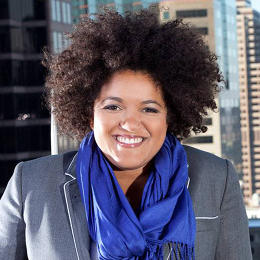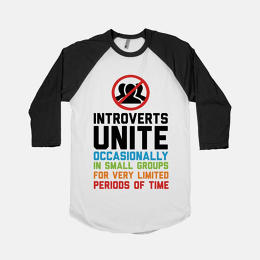Radical Authenticity: A Gay, Black, Female CEO On Why It Pays To Be An Open Book
>Tanisha Robinson is not your average CEO. “I’m 5 foot 11, I have a fro, and I’m black; there’s no hiding that,” she says. “Then, it becomes clear very quickly that I’m gay because I like to mention that I have a wife just to see how people react.” As a black, gay woman, any one of her three identities might be perceived as an extra challenge in the business world.

Tanisha RobinsonBut Robinson doesn’t feel that being open about who she is has been a problem, an experience shared by Apple CEO Tim Cook, who came out this week in a Businessweek op-ed, saying “plenty of colleagues at Apple know I’m gay, and it doesn’t seem to make a difference in the way they treat me.” In fact, Robinson says tolerant workplaces have offered her some much-needed solace when the rest of the world has been less than accepting of her. Early in Robinson’s life, she decided that trying to hide parts of her identity took too much psychic energy. “I’ve always tried to maintain one story: It’s much easier to manage the world that way,” she tells Fast Company. “It’s really difficult trying to juggle inconsistencies. I don’t want to spend my life playing the pronoun game when talking about my significant other. It’s so complicated trying to hide such basic things about myself.” Her openness has sometimes had negative consequences. Robinson’s Mormon family has had a difficult time coming to terms with her sexual orientation. “My parents are continuously worried about my salvation,” she says.
She’s also faced setbacks in her career. Right out of high school, Robinson joined the Army, drawn in by the opportunity to learn Arabic. But she was terminated after four years for being openly gay. Rather than immediately jumping into another profession, Robinson took her time to find spaces where she would feel comfortable: She spent years in Syria teaching English and helping to promote women’s rights; she washed dishes and bartended; she freelanced. Finally, she tried making money as an affiliate marketer and realized that she had good instincts when it came to online businesses. “When I started making $5 a day from affiliate marketing, it was a huge moment because it paid for my daily trip to Starbucks. Before long, it was paying my rent, which allowed me to retire from the restaurant industry altogether,” she says with a laugh.
Given how successful she had been with digital marketing, she decided to try her hand at launching a daily deals site in Ohio. In the process of creating then subsequently selling a startup, she discovered that the tech world is a welcoming place for people who stand out and feel out of place. As she picked up business partners, colleagues, and clients along the way, she realized that people not only accepted her, they didn’t seem to care much about her background or sexual orientation at all. “Fortunately, intolerance is pretty uncool these days,” she says.

Together with her long-term business partner Michael Limes, she founded her current startup, Print Syndicate, an e-commerce company that creates apparel to help people articulate their identity. For instance, they sell a T-shirt that says “Introverts Unite: We’re Here, We’re Uncomfortable, and We Want to Go Home.” Another says “STEM-inist” referring to STEM-field feminists. “We’ve built a company that supports people’s desire to be original and to express themselves,” she says. So far, business is booming: They brought in $4 million in revenue in year one then generated $14 million in year two. They expect the numbers to more than double next year. Robinson has also worked hard to create a company culture in which employees feel comfortable being who they are. An artist at Print Syndicate happens to be a drag queen, so as a show of support, the company bought all the tables at a recent show and employees showed up and had a grand time. “At all levels of the business, we support the fundamental right to be different,” she says.
In spite of her success, she does occasionally run into discrimination at her job. For instance, she and Limes recently met with a potential client: After shaking her hand, the prospect asked Robinson if she was the office manager, since he couldn’t wrap his head around her being the CEO. “In some corners of the world, business is still done between straight white men,” she says. “As a rule, we just don’t work with those folks. Sometimes, it’s disappointing because we could have had such a great partnership had they not been such misogynists.” But Robinson makes it clear that under no circumstances does she misrepresent who she is, even if it means missing out on a partnership deal or an investment. “Some people are just not interested in my style or how I live in the world or the fact that I have a wife. If they are not willing to accept me, it was never going to work anyway,” she says. “The only way that I restrain myself is in terms of how much I swear in conversations: Sometimes I have to consider my audience and judge whether I should use the F-bomb or not. But that’s as far as it goes.” As she looks back at her career so far, she says the workplace has given her the space to thrive, be herself, and focus on her strengths. And professional culture has gotten even more open over the last decade. She remembers when Ellen DeGeneres came out and paved the way for others in show business to be open about their sexuality. She points to oil and energy companies in Ohio that are focusing on diversity. “People are out of the closet in the military and the institution has not collapsed,” she says. She encourages other people from the LGBTQ community to use this freedom, like she did, to find careers in which they will be respected and appreciated. “There’s a huge opportunity for people to test the waters, to be totally themselves and to see what happens,” she says. “And what actually happens, for the most part, is nothing. I don’t get cheered on because I’m out, or black, or a woman. It’s a pretty normal existence. I go home, hang out with my wife, and watch some TV. Isn’t that what all of us want, at the end of the day?”
(239)










